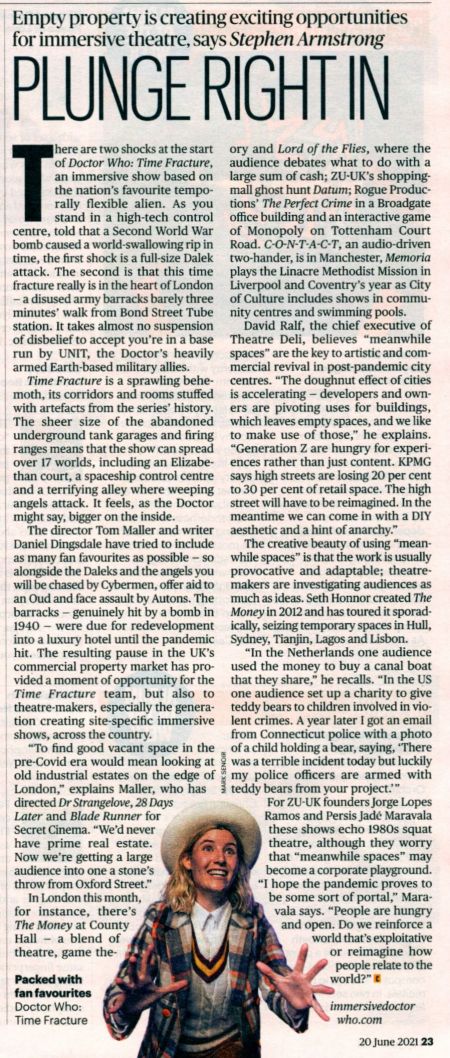Plunge Right In
- Publication: The Times
- Date: 2021-06-20
- Author: Stephen Armstrong
- Page: Culture, p. 23
- Language: English
Empty property is creating exciting opportunities for immersive theatre, says Stephen Armstrong
There are two shocks at the start of Doctor Who: Time Fracture, an immersive show based on the nation's favourite temporally flexible alien. As you stand in a high-tech control centre, told that a Second World War bomb caused a world-swallowing rip in time, the first shock is a full-size Dalek attack. The second is that this time fracture really is in the heart of London — a disused army barracks barely three minutes' walk from Bond Street Tube station. It takes almost no suspension of disbelief to accept you're in a base run by UNIT, the Doctor's heavily armed Earth-based military allies.
Time Fracture is a sprawling behemoth, its corridors and rooms stuffed with artefacts from the series' history. The sheer size of the abandoned underground tank garages and firing ranges means that the show can spread over 17 worlds, including an Elizabethan court, a spaceship control centre and a terrifying alley where weeping angels attack. It feels, as the Doctor might say, bigger on the inside.
The director Tom Mailer and writer Daniel Dingsdale have tried to include as many fan favourites as possible — so alongside the Daleks and the angels you will he chased by Cybermen, offer aid to an Oud and face assault by Autons. The barracks — genuinely hit by a bomb in 1940 — were due for redevelopment into a luxury hotel until the pandemic hit. The resulting pause in the UK's commercial property market has provided a moment of opportunity for the Time Fracture team, but also to theatre-makers, especially the generation creating site-specific immersive shows, across the country.
"To find good vacant space in the pre-Covid era would mean looking at old industrial estates on the edge of London," explains Mailer, who has directed Dr Strangelove, 28 Days Later and Blade Runner for Secret Cinema. "We'd never have prime real estate. Now we're getting a large audience into one a stone's throw from Oxford Street."
In London this month, for instance, there's The Money at County Hall — a blend of theatre, game theory and Lord of the Flies, where the audience debates what to do with a large sum of cash; ZU-UK's shopping-mall ghost hunt Datum; Rogue Productions' The Perfect Crime in a Broadgate office building and an interactive game of Monopoly on Tottenham Court Road. C-O-N-T-A-C-T, an audio-driven two-hander, is in Manchester, Memoria plays the Linacre Methodist Mission in Liverpool and Coventry's year as City of Culture includes shows in community centres and swimming pools.
David Ralf, the chief executive of Theatre Deli, believes "meanwhile spaces" are the key to artistic and commercial revival in post-pandemic city centres. "The doughnut effect of cities is accelerating — developers and owners are pivoting uses for buildings, which leaves empty spaces, and we like to make use of those," he explains. "Generation Z are hungry for experiences rather than just content. KPMG says high streets are losing 20 per cent to 30 per cent of retail space. The high street will have to be reimagined. In the meantime we can come in with a DIY aesthetic and a hint of anarchy."
The creative beauty of using "meanwhile spaces" is that the work is usually provocative and adaptable; theatre-makers are investigating audiences as much as ideas. Seth Honnor created The Money in 2012 and has toured it sporadically, seizing temporary spaces in Hull, Sydney, Tianjin, Lagos and Lisbon.
"In the Netherlands one audience used the money to buy a canal boat that they share," he recalls. "In the US one audience set up a charity to give teddy bears to children involved in violent crimes. A year later I got an email from Connecticut police with a photo of a child holding a bear, saying, 'There was a terrible incident today but luckily my police officers are armed with teddy bears from your project."
For ZU-UK founders Jorge Lopes Ramos and Persis Jade Maravala these shows echo 1980s squat theatre, although they worry that "meanwhile spaces" may become a corporate playground. "I hope the pandemic proves to be some sort of portal," Maravala says. "People are hungry and open. Do we reinforce a world that's exploitative or reimagine how people relate to the world?"
Immersivedoctorwho.com
Caption: Packed with fan favourites Doctor Who: Time Fracture
Disclaimer: These citations are created on-the-fly using primitive parsing techniques. You should double-check all citations. Send feedback to whovian@cuttingsarchive.org
- APA 6th ed.: Armstrong, Stephen (2021-06-20). Plunge Right In. The Times p. Culture, p. 23.
- MLA 7th ed.: Armstrong, Stephen. "Plunge Right In." The Times [add city] 2021-06-20, Culture, p. 23. Print.
- Chicago 15th ed.: Armstrong, Stephen. "Plunge Right In." The Times, edition, sec., 2021-06-20
- Turabian: Armstrong, Stephen. "Plunge Right In." The Times, 2021-06-20, section, Culture, p. 23 edition.
- Wikipedia (this article): <ref>{{cite news| title=Plunge Right In | url=http://cuttingsarchive.org/index.php/Plunge_Right_In | work=The Times | pages=Culture, p. 23 | date=2021-06-20 | via=Doctor Who Cuttings Archive | accessdate=23 December 2025 }}</ref>
- Wikipedia (this page): <ref>{{cite web | title=Plunge Right In | url=http://cuttingsarchive.org/index.php/Plunge_Right_In | work=Doctor Who Cuttings Archive | accessdate=23 December 2025}}</ref>
